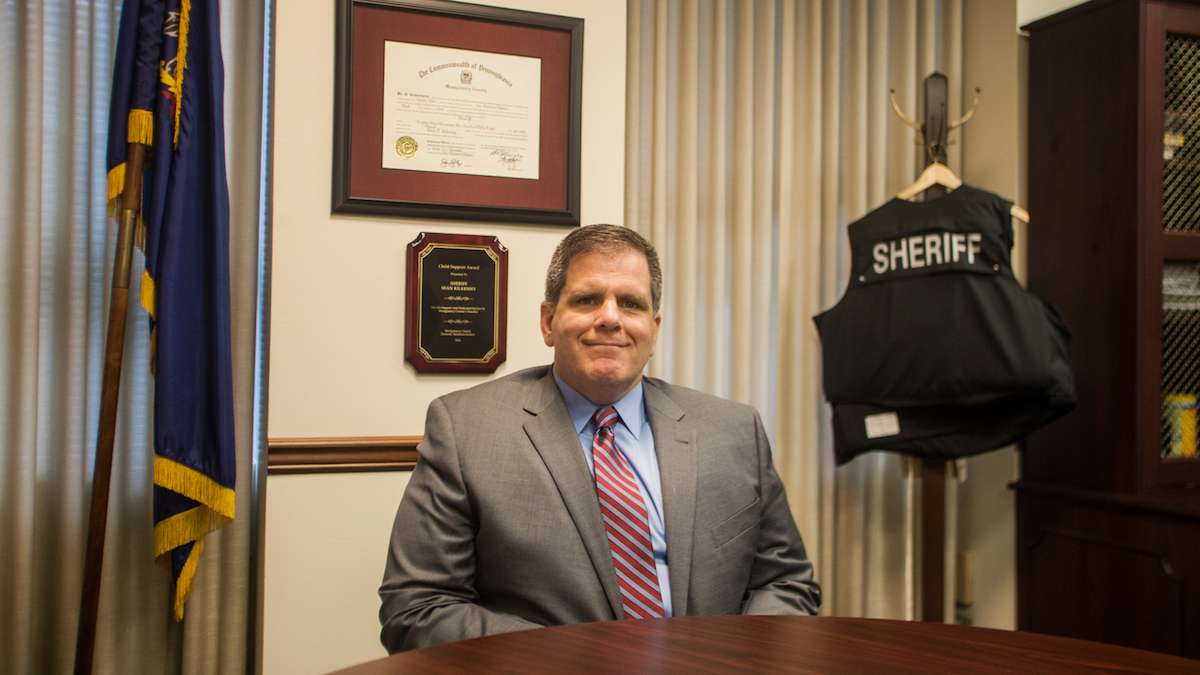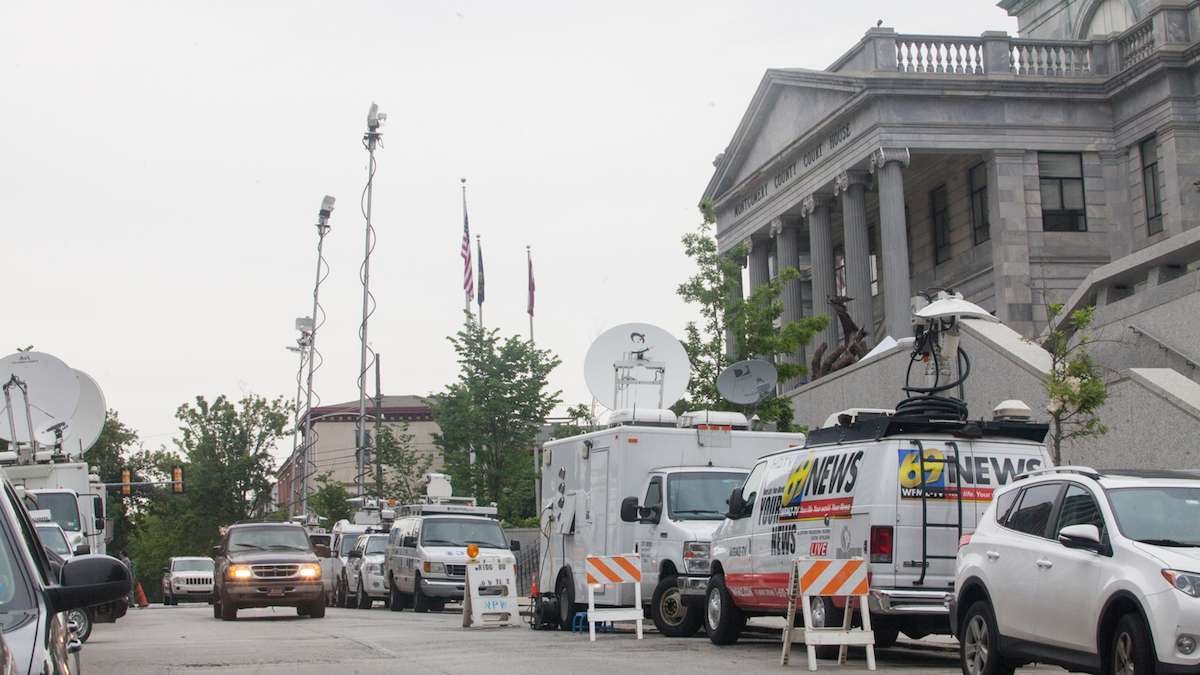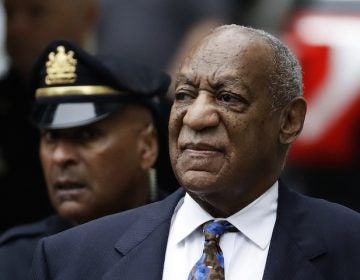Cosby Trial: Day 1
ListenTwo contrasting images of legendary comedian and actor Bill Cosby were portrayed in court Monday — one as serial predator of women, the other as victim of false allegations — during opening arguments at his sexual assault trial in suburban Philadelphia.
[Updated 5:49 p.m.]
Two contrasting images of legendary comedian and actor Bill Cosby were portrayed in court Monday — one as serial predator of women, the other as victim of false allegations — during opening arguments at his sexual assault trial in suburban Philadelphia.
Jurors also heard from one witness on the opening day of what is expected to be a two-week trial at the Montgomery County Courthouse in Norristown. That testimony came from a woman who said Cosby gave her a big white pill and wine during what was supposed to be a brunch at his bungalow in a Los Angeles hotel in 1996. After she became disoriented, the 55-year-old woman testified, she engaged in a sex act with Cosby.
Cosby has been beset by allegations that he drugged and raped or molested nearly 60 women over a half-century, however he is being prosecuted for only one accusation — that he abused former Temple University basketball official Andrea Constand in 2004 at his Cheltenham Township mansion.
Cosby, who has denied all accusations against him, faces up to 10 years in prison if convicted of aggravated indecent assault against the 44-year-old Constand, who lives in Toronto. The trial is being held before a jury brought in from Allegheny County, about 300 miles away.
Serial predator or falsely accused?
The case hinges not on physical evidence but on sworn statements made by the accuser and the accused. Prosecutor Kristen Feden told the jury the case against Cosby is about “trust betrayed and the inability to consent.” She urged jurors to put aside what they think they know about the star of “The Cosby Show” in the 1980s and 1990s and focus instead on his “heinous” crime against Constand.
Listen to the latest episode of WHYY’s podcast, ‘Cosby Unraveled.’
Reading at least nine times from Cosby’s deposition in a civil case brought by Constand in 2005, Feden tried to paint a picture of an older man who drugged and preyed on young women to gratify his sexual needs.
“There are not a lot of facts in dispute. There is no dispute that he gave her pills. There is no dispute that he engaged in sexual conduct with her,” Feden said. “The question here is whether Andrea Constand had the ability to consent. And the answer to that question is no.”
Constand, who was not in court Monday, is expected to testify.
Cosby’s attorney, Brian McMonagle, countered that Constand is an untrustworthy storyteller who has often contradicted herself. McMonagle insisted that Cosby and Constand had a romantic relationship and that their sexual encounter was consensual.
For instance, he said, Constand originally told police she didn’t contact Cosby after the incident, but she actually called him 53 times afterward. McMonagle also focused on a 2005 investigation into Constand’s accusations that did not bring charges. “A false accusation destroys a life,” he said.
He also directed the jury to focus on the stakes for Cosby. “We’re talking about an old man’s tomorrows,” he said.
“You will never see Mr. Cosby running from anything,” McMonagle said.
He said Constand and Cosby had a long-running romance.
“She bought him incense, bought him bath salts. They had dinner, had cognac and brandy and sipped in front of the fireplace,” McMonagle said. “She wasn’t paralyzed. She wasn’t incapacitated. They were romantic together.”
Prosecutors plan to put an expert on the witness stand to testify that survivors of sexual assault often have post-traumatic stress that can fog memories.
‘I felt like I was underwater’
Jurors heard Monday afternoon from the sole alleged victim besides Constand who the judge has allowed to testify. That woman is Kelly Johnson, a project coordinator for a Fortune 500 company in Atlanta. In the 1990s she worked for the William Morris talent agency in Los Angeles, where Cosby was the top client.
Johnson, who often spoke directly to the jury, testified Monday that she does not know Constand and never met her.
While at William Morris, she had the “utmost respect and admiration for [Cosby] based on what millions of other Americans, especially African-American folks, thought of him from ‘The Cosby Show,'” she testified under questioning from the prosecutor.
She described an incident in 1996, when Cosby called her office late in the afternoon and asked her to pick up dinner and bring it to his home so they could review some technical matters. While there, she also helped him practice a scene, playing a tipsy woman who ended up in an embrace with Cosby. Cosby offered her drinks and had her rehearse the scene several times.
They periodically spoke by phone, and he invited her to brunch to discuss her career and life, she testified.
Johnson described another incident at a Bel Air hotel bungalow where the entertainer was staying. He answered the door wearing a bathrobe and slippers, she testified. He said lunch was being brought to the room. Johnson said she doesn’t think they ate but they had wine.
“He told me to relax a little bit” and extended his hand, which held a large white pill, she said, choking back tears.
“Would I give you anything to hurt you? Trust me,” she testified, recounting his words.
She said she felt intimidated and planned to spit it out in the bathroom, but he gave her a glass of wine, and she swallowed the pill instead. In the bathroom she saw several prescription pill bottles. She could not tell which one he had given her, because she couldn’t read the labels and had lost sense of time.
“I felt like I was underwater,” she testified.
When she left the bathroom, Cosby was on the bed. She laid on the bed, she said, and recalls her dress being pulled up from the bottom and down from the top, exposing her breasts. Cosby put lotion in her hand and made her touch his penis, she said, crying.
Asked if she remembered anything else, Johnson shook her said no, sobbing.
She said Cosby later called William Morris and said she was ungrateful and tried to get her fired. Even though her father was a retired Los Angeles police detective, Johnson “was afraid” to call authorities, she said.
Asked if she consented to what she did with Cosby at the hotel, she replied, “No, I didn’t.”
“Could you?” she was asked.
“No, I couldn’t.”
Defense challenges Johnson’s account
Cosby, wearing a dark suit and a yellow-striped tie, leaned forward and appeared to be listening intently during Johnson’s account, at times conferring with McMonagle. His TV daughter, Keisha Knight Pulliam, who played the character Rudy Huxtable, stayed through the morning and escorted Cosby in and out of the courtroom.
During cross-examination, Johnson said she did not take illegal drugs during the 1990s.
Listen to the latest episode of WHYY’s podcast, ‘Cosby Unraveled.’
But McMonagle challenged Johnson’s version of events based on human resources records from William Morris and a deposition Johnson gave in 1996. Johnson said then that her sexual encounter with Cosby occurred in 1990 — six years earlier than she said in court Monday.
“I don’t know why I would have said that,” Johnson testified. “I can tell you that I was bawling in that deposition and I didn’t want to tell anything about what happened.”
They also read from a report written by a human resources employee at William Morris. Those notes, taken after her alleged assault by Cosby, documented some of the problems Johnson had at work that eventually led to her firing. She later filed a workers compensation claim against the agency.
Johnson was also questioned about her connection to attorney Gloria Allred and about media appearances she had done around the time that she came forward with her accusations.
She answered many defense questions with the words “I do not recall.”
Her repetition of that phrase led McMonagle to ask if she has “selective amnesia” for this case.
On re-direct, prosecutor M. Stewart Ryan had Johnson repeat the timeline and details of the alleged assault.
To explain her reaction and subsequent firing, Johnson said, “I was humiliated, and afraid because I had a secret about the biggest celebrity in the world at that time.”
After Johnson left the stand, the judge held a hearing on whether to allow the prosecution’s request to allow her mother and another attorney to testify. The judge did not issue a ruling from the bench.
‘Looked up to Bill Cosby as a child’
The Cosby trial, seen as America’s most high-profile celebrity trial since O.J. Simpson was charged with killing his ex-wife and another man in 1994, is expected to take about two weeks.
Among those in attendance Monday was high-profile California attorney Gloria Allred, who represents Johnson and many other women who have made allegations against Cosby. “This is an historic day. It’s the first time Mr. Cosby will have to face his accusers in a criminal court.”
Monica Lyons, a freelance photographer whose son Nile was on “The Cosby Show,” showed up to cover the trial and lend her support to the entertainer.
There were no protesters or fans outside the courthouse this morning. But more than 100 reporters from outlets as far away as Denmark mobbed the courthouse steps to await Cosby’s arrival.
Milo Dominguez, 18, a Drexel University freshman, showed up at 6:30 a.m. to be one of the 30 members of the public allowed to watch in the courtroom. But that wasn’t early enough. He could only get into an overflow courtroom, where the proceedings would be shown on a TV screen.
“What can you do?” he said, disappointed.
Dominguez said he wasn’t sure whether Cosby is guilty or not, adding that he finds the number of his accusers persuasive.
“That many people aren’t going to lie,” he said.
Bill Parker, a donut maker from Lower Pottsgrove whose shop is closed Mondays, also arrived about 6:30.
“Like many other people, I looked up to Bill Cosby as a child,” Parker said. “His show was one of the few sitcoms on TV where parents could feel safe letting their children watch. I was very sad years later to find out Bill Cosby wasn’t the man we thought he was. To me, he’s already guilty of being an immoral man, as he’s confessed to being guilty of having an extramarital affair.”
Tough security measures were evident early Monday, with metal barricades blocking most access to the courthouse, a police bomb-sniffing K-9 and his handler scouring the grounds, and lane restrictions in place.
The courthouse also has new bulletproof glass “ballistics shields” at its front and back entrances to protect against active shooters and other threats, Montgomery County Sheriff Sean Kilkenny said.
Because Montgomery County is the state’s third-largest county, Kilkenny said, he’s used to high-profile cases.
Still, he added, “this is a new level of interest, because this is an international level of interest.”
The jury, which arrived in a bus, is being sequestered at a nearby hotel for the duration of the trial, at an estimated cost of $100,000 to $200,000, Kilkenny said.
‘My one goal is to have a fair and impartial jury trial’
For most of the morning session Monday, Judge Steven T. O’Neill explained courtroom procedures to jurors.
“Statements made by counsel do not constitute evidence,” said O’Neill. He held up a red piece of paper, like a soccer referee, to demonstrate what an objection is, and a green slip when talking about evidence which is fair game.
But most of his lecture was devoted to explaining the limitations their sequestration puts in place.
“It is 2017, not 1917,” Judge O’Neill told jurors. “If it was then, sequestration and blocking everything from you is easily done. That ship has sailed.”
The judge added: “My one goal is to have a fair and impartial jury trial … and to protect the jury as best I can.”
Turning to the audience, he also pleaded with members of the media to honor the sequestration.
“Let them do their job,” said O’Neill. “They’re 300 miles away from home — their routines, what they do each and every day, their families, their work. Please, I understand the rights of free press and access, but not now. Let the trial play out.”
That privacy may not last. Late last week, Philadelphia Media Network filed a motion to get juror names, which have not been shared, as well as transcripts from hearings in the case. Arguments from counsel on that motion will be heard at the end of the day Monday.
3 blue pills, then a sexual encounter
The trial caps a dramatic fall for the entertainment icon and favorite son of Philadelphia who has long been known around the nation and world as “America’s dad” for his paternal role as Dr. Cliff Huxtable on the show named after him.
The central theme of his accuser’s stories is that Cosby drugged them with pills and alcohol he provided, and then had sex with them. While Cosby has settled civil lawsuits with some of the women, he has denied sexually assaulting any of them.
The only case that has led to a criminal charge involves his alleged attack of Constand. Cosby reached a settlement with Constand in a civil case she brought.
Other women came forward with their charges after the statute of limitations had expired in the jurisdiction where they said his crime occurred.
Cosby, a North Philadelphia native and Temple alumnus, booster and former member of the university’s Board of Trustees, met Constand in 2002 at a school basketball game.
Cosby has said he remembers being struck by Constand’s appearance the first time he spied her. Tall and athletic with a curly mane of hair, Constand, who was born in Canada, played basketball for the University of Arizona before playing professionally in Italy.
Listen to the latest episode of WHYY’s podcast, ‘Cosby Unraveled.’
Over time during her tenure at Temple, Cosby arranged get-togethers with Constand, during which the comedian would offer career advice over meals at restaurants and at his home. To Constand, Cosby became mentor and acquaintance, but she had said it was never a romantic connection. Constand is a lesbian and was dating women while her bond to Cosby developed.
But in early 2004, Constand arrived at Cosby’s residence in the midst of a professional crisis. Feeling beset by the stress of her job working for the women’s basketball team, Constand was mulling a career transition. Massage therapy was the vocation that had appealed to her, yet the thought of departing Temple was not easy for her to consider.
To put her at ease, Cosby offered her three blue pills. At the time, according to court documents, Cosby told Constand they were herbal pills. Later, Cosby told Constand’s mother that the pills were Benadryl. Authorities would later suspect the drugs were far more potent.
After Cosby urged her to take them down to take the edge off, Constand claims she began to feel woozy. She would later tell police that she was going in and out of consciousness and that her legs felt rubbery. At times, she said, she felt frozen.
The next thing Constand said she remembers is waking up around 4 a.m. with her clothes disheveled and feeling violated. She said Cosby had fondled her without her consent.
When Cosby sat for a four-day civil deposition that Constand would later file against the entertainer, he said the interaction was “somewhere between permission and rejection,” saying he was never stopped.
Two days before Pennsylvania’s statute of limitations was set to expire in December 2015, prosecutors in Montgomery County announced felony charges of aggravated indecent assault against Cosby.
For the past 18 months, Cosby’s legal team has vociferously sought to have the case dismissed by filing a flurry of pretrial motions but O’Neill allowed the case to proceed.
WHYY is your source for fact-based, in-depth journalism and information. As a nonprofit organization, we rely on financial support from readers like you. Please give today.














